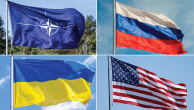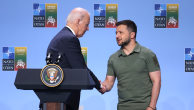Here are key takeaways about global views of Russia and Putin in the 35 countries we surveyed:
- Opinions of Russia are broadly negative, with majorities in more than half of the surveyed countries holding an unfavorable view.
- Confidence in Putin remains low across the surveyed countries, though relatively large shares in the Asia-Pacific region and sub-Saharan Africa have confidence in him.
- In some places, views of Russia and Putin have warmed slightly since reaching historic lows in 2022 amid Russia’s invasion of Ukraine.
Favorability of Russia
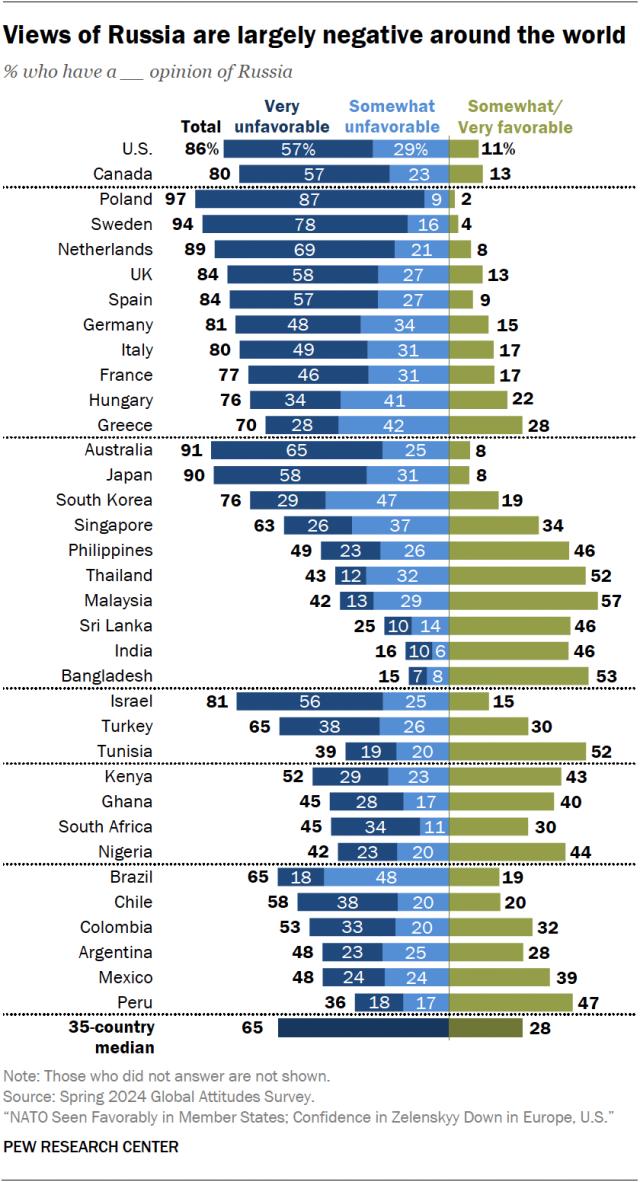
Overall, a median of 65% of adults in the surveyed countries have an unfavorable view of Russia, while 28% have a favorable view.
Related: Overall opinion of Russia in 2023
Views of Russia are particularly negative in some countries. At least three-quarters of adults in Australia, Canada, Israel, Japan, South Korea and the U.S. – as well as in many European countries – have an unfavorable view of Russia. In many high-income countries surveyed, majorities have a very unfavorable view of Russia.
Malaysia is the only country where a majority express a favorable opinion of Russia, with nearly six-in-ten Malaysians saying this. Opinion is more mixed in other middle-income countries: Roughly half hold a favorable view of Russia in Bangladesh, Peru, Thailand and Tunisia. In some middle-income countries, however, about a quarter of respondents or more do not offer an opinion.
How opinion of Russia has changed over time
Although views of Russia generally remain negative, ratings have improved slightly in several countries since last year. For example, the share of Argentines with a favorable opinion of Russia reached an all-time low of 17% in 2023. This year, the share has risen by 11 points to 28%.
The rise in favorable views of Russia is less pronounced in other countries, including Germany, Mexico and South Korea. In each, the share of adults with a positive opinion has increased by 5 points since last year. The share holding a positive view has also grown in Malaysia and Singapore, where we last surveyed in 2022, immediately following Russia’s invasion of Ukraine.
In some countries we last surveyed before the invasion of Ukraine, the share of people with a positive opinion of Russia is significantly lower today. For example, in Chile, favorable views of Russia are now at an all-time low, with only 20% saying they have a positive view of the country. In 2017, by comparison, 34% of Chileans had a positive view of Russia. Similarly, in the Philippines, the share of people who express a favorable opinion of Russia has dropped 10 points since 2017 (from 56% to 46%).
(For more on views of Russia over time, read Appendix A.)
How opinion of Russia varies within countries
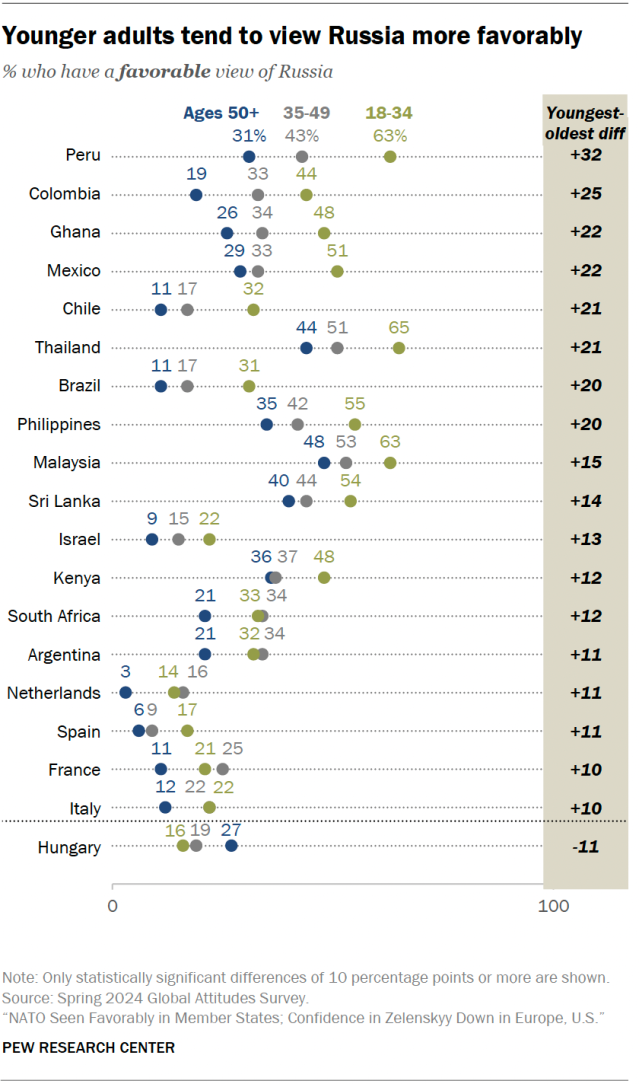
In most of the surveyed countries, younger adults are more likely than older people to have a favorable opinion of Russia. Previous Pew Research Center surveys have found a similar pattern.
In most countries, the gap between younger and older adults is 10 percentage points or more. For example, in Peru, 63% of adults under 35 have a positive opinion of Russia, compared with 31% of adults 50 and older (though older Peruvians are less likely to provide a response).
Views also vary by political ideology in a few places. In Hungary, people on the ideological right are 24 points more likely than those on the left to have a favorable view of Russia (38% vs. 14%).
In Israel, the reverse is true: 33% of those on the left express a positive opinion of Russia, compared with only 6% of those on the right.
Confidence in Putin
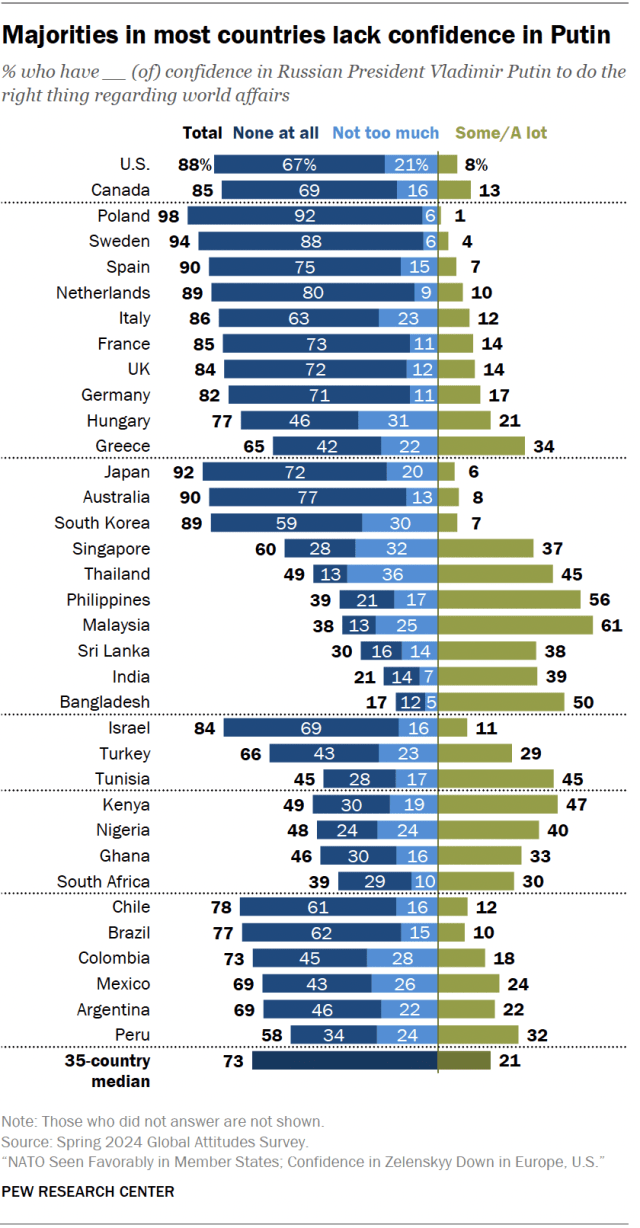
Most people in the countries we surveyed have little or no confidence in Putin to do the right thing regarding world affairs. A median of 73% express not too much or no confidence at all in him.
Views are overwhelmingly negative in Europe, with sizable majorities in every surveyed country expressing a negative view of Putin. Greece is the only European nation polled where more than one-quarter of adults have confidence in Putin.
Views are more varied outside Europe. Malaysia and the Philippines are the only two countries surveyed where majorities express confidence in Putin, including about two-in-ten in each country who have a lot of confidence in the Russian president.
In the four countries surveyed in sub-Saharan Africa – Ghana, Kenya, Nigeria and South Africa – views of Putin are somewhat more negative than positive.
Confidence in Putin also remains low in Latin America. In fact, majorities in Chile (61%) and Brazil (62%) say they have no confidence at all in the Russian president.
In some middle-income countries, sizable shares do not offer an opinion on Putin. This is the case for two-in-ten or more in Bangladesh, Ghana, India, South Africa and Sri Lanka.
How confidence in Putin has changed over time
In most places, confidence in Putin has remained relatively stable since last year. In some countries, views have even warmed slightly following the historic lows seen in 2022 and 2023. For example, in Argentina and Germany, confidence in Putin is up by 9 points since last year, with around two-in-ten in each country saying they have at least some confidence in him.
In countries where we have not surveyed since before Russia’s invasion of Ukraine, confidence in Putin is down slightly today. For example, confidence in the Russian president is down by 8 points in Chile, dropping from 20% in 2017 to 12% this year – a new low.
(For more on views of Putin over time, read Appendix A.)
How confidence in Putin varies within countries
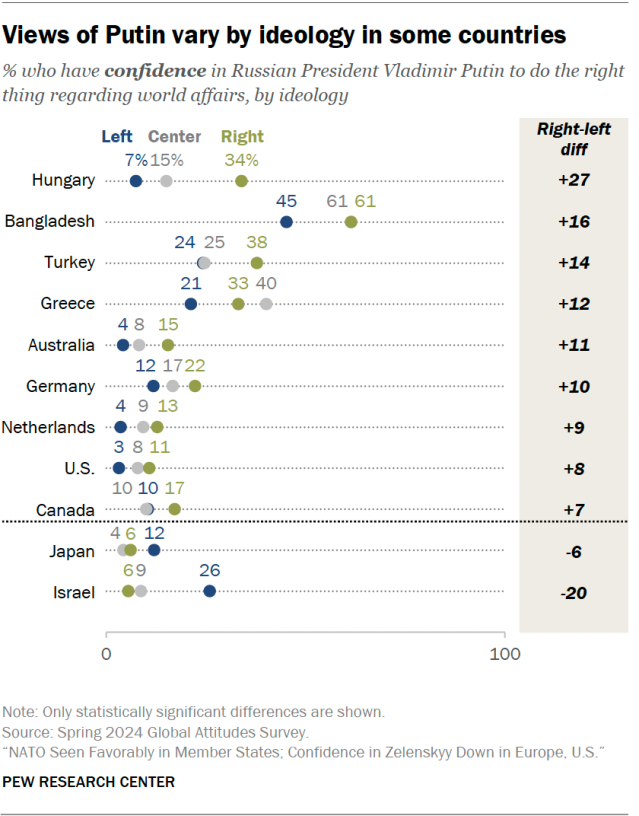
Ratings of Putin vary by political ideology in some countries. Adults who place themselves on the right are more likely than those on the left to express confidence in the Russian president. This ideological gap is widest in Hungary, where those on the right are 26 points more likely than those on the left to express confidence in Putin (34% vs. 7%). There is a similar pattern in Australia, Bangladesh, Canada, Germany, Greece, the Netherlands, Turkey and the U.S.
In Israel, however, this pattern is reversed. Roughly a quarter of Israelis on the ideological left (26%) have confidence in the Russian president, compared with only 6% of those on the right. We see a similar pattern in Japan.
As observed in previous surveys, confidence in Putin among Europeans can also vary based on support for right-wing populist parties in their country. Those who have a favorable view of right-wing populist parties in their country are often more likely to have confidence in the Russian president. For example, 45% of Germans who support Alternative for Democracy (AfD) express confidence in Putin, while only 10% of nonsupporters agree. Rising shares of right-wing populists are confident in Putin in several countries, including France, Germany, Hungary, the Netherlands, Sweden and the UK. (For more information on how we categorize populist party support, read Appendix C.)
In some middle-income countries, people with more education are also more likely to have confidence in Putin than their counterparts with less education. For example, in Bangladesh, 70% of adults with more education express confidence in Putin, compared with fewer than half (45%) of those with less education. A similar pattern exists in some Asia-Pacific countries – including India, Thailand and Sri Lanka – as well as in Ghana, Peru, Tunisia and South Africa. Adults with less education in these places are also often less likely to offer an opinion.

